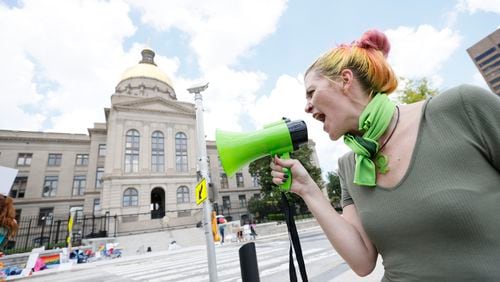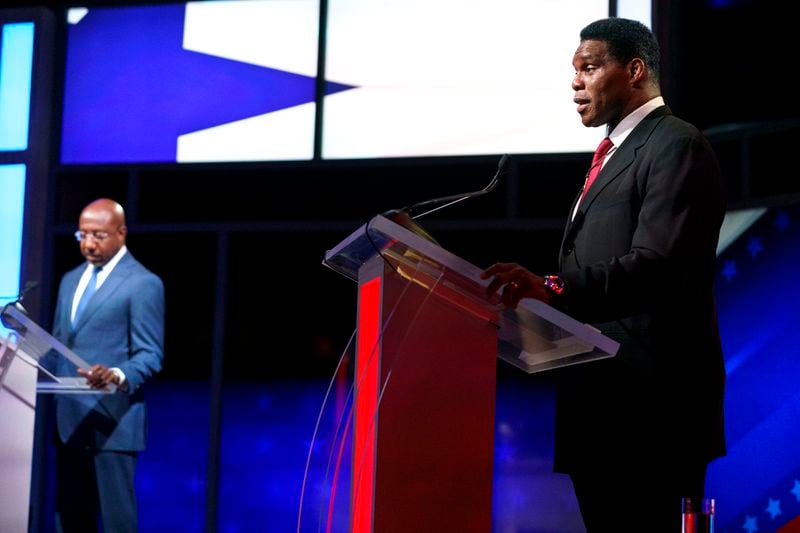Peggy Wright was driving home when she stumbled on Republican U.S. Senate hopeful Herschel Walker holding a campaign rally in Gainesville. She pulled over and, before joining the crowd of supporters, reached into the trunk of her car for the sign she always keeps there: “Vote Pro-Life.”
Abortion isn’t just an important issue to Wright. “It’s the only issue,” she said. That’s why she’ll return to her polling place to cast a ballot for Walker in the runoff.
Amy Howard helped organize an Atlanta fundraiser in October for a group that helps women in the Southeast obtain abortions. A sex therapist, Howard regularly counsels women on their reproductive options and has had to navigate the recent changes in Georgia’s law.
“It’s crucial,” she said of abortion rights. “More than half the planet is women, and this is about their bodily autonomy.”
Howard also plans to vote in the runoff — for Democratic incumbent Raphael Warnock.
Abortion has always engendered strong — and sometimes emotional — responses.
Walker and Warnock are tapping into those beliefs, hoping to get Georgians back out to vote in their Dec. 6 runoff. It helps that on Tuesday a judge blocked enforcement of Georgia’s strict abortion ban, ruling the law that took effect earlier this year is unconstitutional. The decision has been appealed, and it has cast a spotlight back on abortion in Georgia at a politically important moment. For both sides, the decision makes clear that issue is still in flux.
Seven out of 10
Ever since the U.S. Supreme Court struck down constitutional protection for abortion in June, both political parties have wondered whether the decision would energize abortion rights supporters — particularly women — to vote or would it fade away as they worried about inflation and the economy.
The midterm elections held earlier this month provided a partial answer. In Georgia, an Associated Press exit poll showed seven out of 10 voters said abortion was either the single most important factor or an important factor in their vote. Only the economy ranked higher.
“You saw in the midterms that people were highly motivated to make sure reproductive freedom options are preserved,” said Melita Easters, executive director of Georgia WIN List, which works to elect women who support abortion rights. “I believe they will remain highly motivated in the runoff.”
Already, abortion rights supporters and opponents are pouring money into the Georgia race
Susan B. Anthony Pro-Life America, which donated $5,000 to Walker’s general election campaign, announced it will invest at least $1 million to aid him in the runoff.
Planned Parenthood Votes took the wraps off a new 15-second digital ad attacking Walker and supporting Warnock. Before the runoff, Warnock had collected more than $34,000 from abortion rights political action committees such as the Planned Parenthood Action Fund and NARAL Pro Choice America.
Stark differences
There are other reasons why the question of abortion resonates in the Georgia race.
“Not only does abortion rate highly on the list of issues people are thinking about,” said Amy Steigerwalt, a political science professor at Georgia State University, “it’s also one where the differences are incredibly stark between the two candidates.”
Warnock, who calls himself a “pro-choice pastor,” supports abortion rights. He has not said whether he backs any limits on abortion, drawing fire from conservatives and some in the religious community.
Walker originally said he backed an absolute ban on abortion without exceptions for rape and incest or when the life of the mother is at stake. But during the campaign he has also expressed support for two measures that contain exceptions: a nationwide abortion ban proposed by U.S. Sen. Lindsey Graham that would bar most abortions after 15 weeks and a ban after six weeks that was part of the Georgia law struck down this past week in a ruling now being appealed to the state Supreme Court.
Credit: Greg Nash/The Hill
Credit: Greg Nash/The Hill
One of the most heated exchanges in the candidates’ Oct. 14 debate centered on abortion.
“A patient’s room is too narrow and small and cramped, a space for a woman, her doctor and the United States government,” Warnock said, repeating a line he uses often on the campaign trail.
“May I respond?” Walker asked.
,“He did not mention that there was a baby in that room as well,” Walker continued.
But Walker’s staunch opposition to abortion was undermined when two former girlfriends claimed in news reports that he pressured them to obtain abortions and paid for the procedures. Walker has denied the claims. Democrats have accused him of hypocrisy.
Steigerwalt said that, to the extent the election hinges on abortion, Warnock has the advantage.
Women, and particularly Black women, are the electorate’s most “faithful voters,” turning up election after election. They also support abortion rights in larger numbers.
Additionally, enthusiasm is typically higher for the side looking to make up lost ground.
“For years, you saw less enthusiasm (from the abortion rights side) because they had won,” she said. “Now we’ve seen that status quo is flipped on its head.”
About the Author









